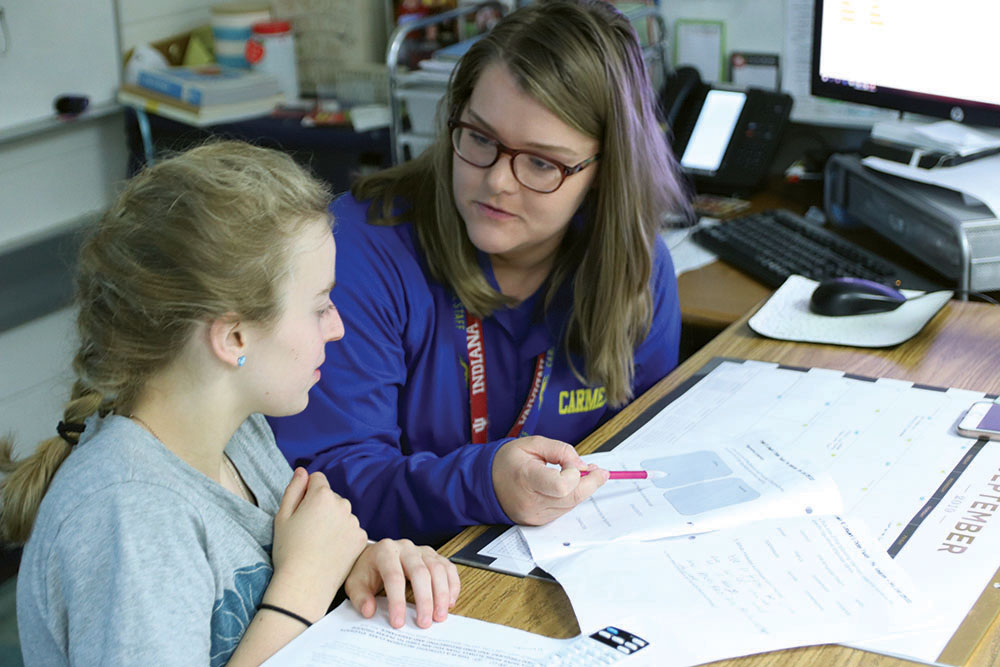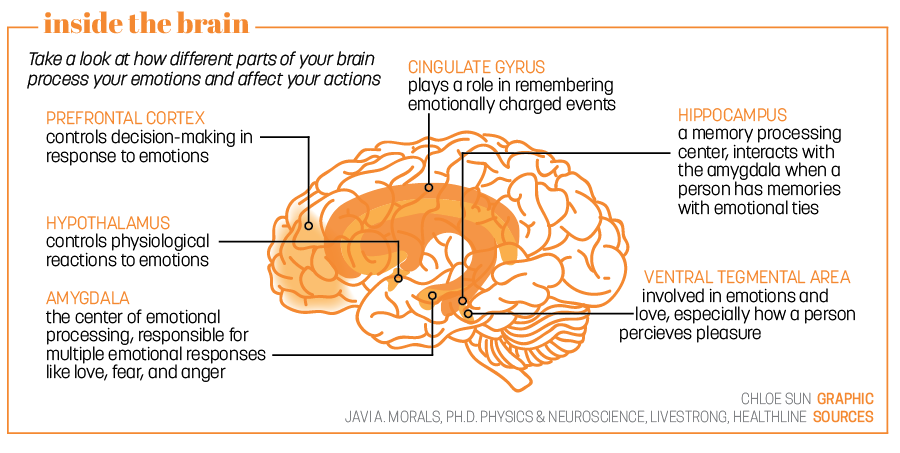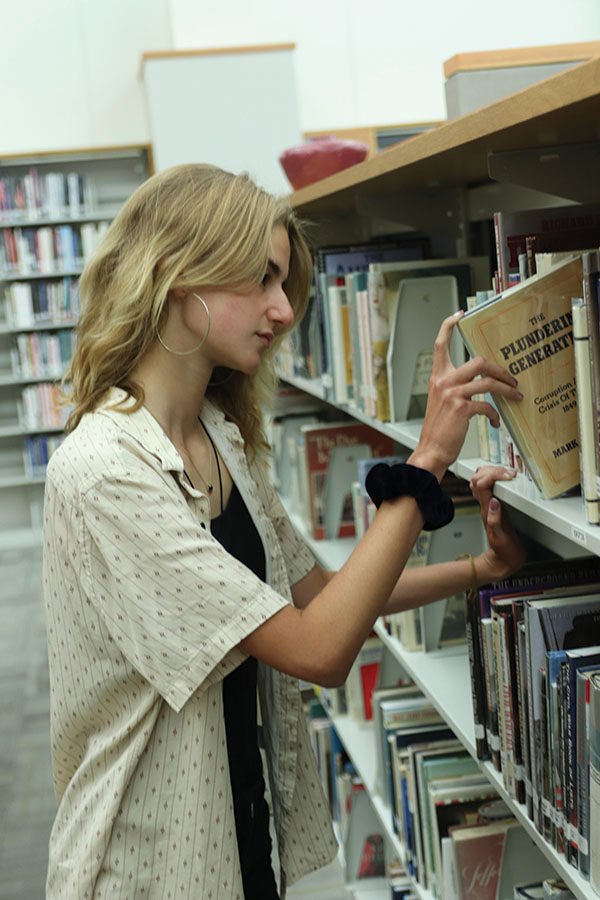
Sophomore Jessie Godfrey writes song lyrics in the library during SRT. Besides writing poetry, she writes songs and music. Godfrey said she plays guitar and is inspired by many musicians.
As Erin Takahashi, student writer and senior, goes throughout her day, she feels emotions as any other human being does. However, for her, those emotions become a catalyst for story ideas. Before the idea fades, she quickly writes it down somewhere and puts it away to mull over.
Later on, this idea may shift in another direction or change entirely. The end of the story might even change, simply because of one thing: her emotions at the time of writing.
Takahashi’s method is not unique. Jessie Godfrey, student writer and sophomore, said she may change an idea based off of feeling as well. When Godfrey begins to write a poems, for example, she said she often uses notes taken from phrases or words spoken in conversations she’s in; however, her writing process is quite flexible.
“(My process) sounds really random,” Godfrey said. “(My poems) usually morphs into something completely different from what I originally intended.”
Similarly, Takahashi said her writing is also subject to change, especially when she has a bad day. She releases those emotions through her stories, which often change to a negative tone. For example, she said she might write a story of a person with amnesia and use methods like addressing the audience to establish a creepy mood.
“Every time the audience questions the character in text, the character will respond with unsettling answers,” Takahashi said, “and the character will constantly ask why the audience asks those questions.”
According to Jillian Vonderohe-Schmidt, advanced composition teacher and Just Write Club sponsor, outside influences do play a major role in writing, emotional or otherwise.
“I think (students) have higher expectations for the things they read in class,” Vonderohe-Schmidt said, “(as well as) for the type of references we make in class and they are inherently just more exposed to that depth.”
Takahashi is one such student with high expectation. Besides being heavily influenced by emotions, she said she has high standards for how she presents those feelings through her characters as well.
“In recent movies, just the form of writing in general (in scripts), I’ve noticed that (the writers) focus more on setting instead of characters, most of the time, so characters lack expression or character,” Takahashi said. “It’s all right to have an interesting setting, but you have to show some kind of emotion. Even if they’re emotionless characters, you have to present them in a way where they’re described as emotional.”
Takahashi credited this recent phenomenon to the Hunger Games series and its large following, but added it could just be her being “personally being picky about stories.”
Vonderohe-Schmidt added onto Takahashi’s reference of pop culture, saying trends in media might also create a general shift in writing style.

Jillian Vonderohe-Schmidt, Just Write Club sponsor and English teacher, helps a student with a creative writing assignment during SRT. She said she always wants students to feel as if they can ask her for help because she knows through guidance each student can write well and efficiently.
“I would say especially how I see (this change) in media with the rise of streaming services that allow us to binge watch more and more series rather than just going to the movies and seeing an hour-and-a-half-long story,” Vonderohe-Schmidt said. “We get so much more depth because we can hang onto those characters for days, instead of an hour and a half or two hours. So (new media) allows for much more complexity and many more subplots than the usual movie has the ability to have.”
Yet, both Takahashi and Godfrey said a good writer must be able to put in as much of their emotion as possible. Takahashi said while one could write based off trends and that writing may even be successful, it often ends up rather dull, as the writer may not feel connected to that story.
“Blandness can be overshadowed by interesting settings or just a very popular archetype and that can overshadow everything bad, too,” Takahashi said, adding that overplaying the setting is just one recent trend that she’s noticed.
Godfrey said having a narrow mindset while writing is never beneficial, whether it be limiting oneself to a trend or otherwise.
“(I think) starting with a title is an awful idea,” Godfrey said, elaborating that it already sets a course for a story that may not otherwise have gone down—thus trapping an idea.
For Takahashi, the best way to overcome writer’s block is to connect with her emotions throughout the process.
“It’s because I as a person don’t like to express a lot to a lot of people as I have an isolated personality. With writing, I get to be as expressive as I can,” Takahashi said. “It’s just easier that way.”





























![Keep the New Gloves: Fighter Safety Is Non-Negotiable [opinion]](https://hilite.org/wp-content/uploads/2024/12/ufcglovescolumncover-1200x471.png)
















































![Review: “We Live in Time” leaves you wanting more [MUSE]](https://hilite.org/wp-content/uploads/2024/12/IMG_6358.jpg)
![Review: The premise of "Culinary Class Wars" is refreshingly unique and deserving of more attention [MUSE]](https://hilite.org/wp-content/uploads/2024/12/MUSE-class-wars-cover-2.png)
![Introducing: "The Muses Who Stole Christmas," a collection of reviews for you to follow through winter [MUSE]](https://hilite.org/wp-content/uploads/2024/12/winter-muse-4.gif)
![Review: "Meet Me Next Christmas" is a cheesy and predictable watch, but it was worth every minute [MUSE]](https://hilite.org/wp-content/uploads/2024/11/AAAAQVfRG2gwEuLhXTGm3856HuX2MTNs31Ok7fGgIVCoZbyeugVs1F4DZs-DgP0XadTDrnXHlbQo4DerjRXand9H1JKPM06cENmLl2RsINud2DMqIHzpXFS2n4zOkL3dr5m5i0nIVb3Cu3ataT_W2zGeDAJNd_E-1200x884.jpg)
![Review: "Gilmore Girls", the perfect fall show [MUSE]](https://hilite.org/wp-content/uploads/2024/11/gilmore-girls.png)
![Review in Print: Maripaz Villar brings a delightfully unique style to the world of WEBTOON [MUSE]](https://hilite.org/wp-content/uploads/2023/12/maripazcover-1200x960.jpg)
![Review: “The Sword of Kaigen” is a masterpiece [MUSE]](https://hilite.org/wp-content/uploads/2023/11/Screenshot-2023-11-26-201051.png)
![Review: Gateron Oil Kings, great linear switches, okay price [MUSE]](https://hilite.org/wp-content/uploads/2023/11/Screenshot-2023-11-26-200553.png)
![Review: “A Haunting in Venice” is a significant improvement from other Agatha Christie adaptations [MUSE]](https://hilite.org/wp-content/uploads/2023/11/e7ee2938a6d422669771bce6d8088521.jpg)
![Review: A Thanksgiving story from elementary school, still just as interesting [MUSE]](https://hilite.org/wp-content/uploads/2023/11/Screenshot-2023-11-26-195514-987x1200.png)
![Review: "When I Fly Towards You", cute, uplifting youth drama [MUSE]](https://hilite.org/wp-content/uploads/2023/09/When-I-Fly-Towards-You-Chinese-drama.png)
![Postcards from Muse: Hawaii Travel Diary [MUSE]](https://hilite.org/wp-content/uploads/2023/09/My-project-1-1200x1200.jpg)
![Review: "Ladybug & Cat Noir: The Movie," departure from original show [MUSE]](https://hilite.org/wp-content/uploads/2023/09/Ladybug__Cat_Noir_-_The_Movie_poster.jpg)
![Review in Print: "Hidden Love" is the cute, uplifting drama everyone needs [MUSE]](https://hilite.org/wp-content/uploads/2023/09/hiddenlovecover-e1693597208225-1030x1200.png)
![Review in Print: "Heartstopper" is the heartwarming queer romance we all need [MUSE]](https://hilite.org/wp-content/uploads/2023/08/museheartstoppercover-1200x654.png)




